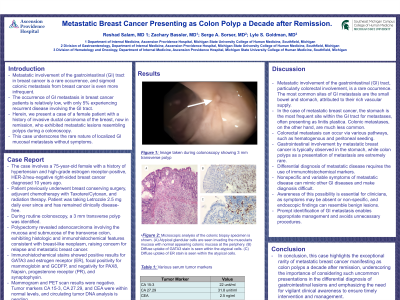Tuesday Poster Session
Category: Colon
P3056 - Metastatic Breast Cancer Presenting as Colon Polyp Decade After Remission
Tuesday, October 24, 2023
10:30 AM - 4:00 PM PT
Location: Exhibit Hall

Has Audio

Reshad Salam, MD
Ascension Providence Hospital/Michigan State University
Southfield, Michigan
Presenting Author(s)
Reshad Salam, MD1, Zachary Bassler, MD2, Serge Sorser, MD3, Lyle S.. Goldman, MD2
1Ascension Providence Hospital/Michigan State University, Southfield, MI; 2Ascension Providence Hospital, Southfield, MI; 3Ascension Providence Hospital, Novi, MI
Introduction: Metastatic involvement of the gastrointestinal (GI) tract in breast cancer is a rare occurrence, and colonic metastasis from breast cancer is even more infrequent. The occurrence of GI metastasis in breast cancer patients is relatively low, with only 5% experiencing recurrent disease involving the GI tract. Herein, we present a case of a female patient with a history of invasive ductal carcinoma of the breast, now in remission, who was found to have a polyp on surveillance colonoscopy that proved to be metastatic breast cancer. To our knowledge, this is the first reported case of metastatic breast cancer diagnosed as colon polyp a decade after presumed complete remission.
Case Description/Methods: The case involves a 75-year-old female with a history of pT2 N1a high-grade estrogen receptor-positive, HER-2/neu-negative right-sided breast cancer diagnosed 10 years ago. She underwent breast conserving surgery, adjuvant chemotherapy with Taxotere/Cytoxan, and radiation therapy. The patient has been on continuous hormonal therapy with Letrozole 2.5 mg daily and has remained clinically disease-free. Surveillance colonoscopy revealed a usually appearing 3 mm transverse polyp. The polyp was endoscopically removed and histology revealed adenocarcinoma involving the mucosa and submucosa of the transverse colon, exhibiting histologic and immunohistochemical features consistent with breast-like neoplasm, raising concern for metastatic breast cancer. Immunohistochemical stains showed positive results for GATA3 and estrogen receptor (ER), focal positivity for mammoglobin and GCDFP, and negativity for PAX8, Napsin, progesterone receptor (PR), and synaptophysin. Physical exam, mammography and PET scan results were normal and showed no evidence of disease. Tumor markers were within normal levels, and circulating tumor DNA analysis is pending.
Discussion: Gastrointestinal involvement by metastatic breast cancer is typically observed in the stomach, while colon polyps as a presentation of metastasis are extremely rare. Diagnosis requires the use of immunohistochemical markers. Nonspecific and variable symptoms can make diagnosis difficult. Awareness of this possibility is essential for clinicians, as symptoms may be absent or non-specific, and endoscopic findings can resemble benign lesions. We provided this case report to increase awareness of breast cancer metastasis to gastrointestinal tract. Prompt identification of GI metastasis enables appropriate management and avoids unnecessary procedures.

Disclosures:
Reshad Salam, MD1, Zachary Bassler, MD2, Serge Sorser, MD3, Lyle S.. Goldman, MD2. P3056 - Metastatic Breast Cancer Presenting as Colon Polyp Decade After Remission, ACG 2023 Annual Scientific Meeting Abstracts. Vancouver, BC, Canada: American College of Gastroenterology.
1Ascension Providence Hospital/Michigan State University, Southfield, MI; 2Ascension Providence Hospital, Southfield, MI; 3Ascension Providence Hospital, Novi, MI
Introduction: Metastatic involvement of the gastrointestinal (GI) tract in breast cancer is a rare occurrence, and colonic metastasis from breast cancer is even more infrequent. The occurrence of GI metastasis in breast cancer patients is relatively low, with only 5% experiencing recurrent disease involving the GI tract. Herein, we present a case of a female patient with a history of invasive ductal carcinoma of the breast, now in remission, who was found to have a polyp on surveillance colonoscopy that proved to be metastatic breast cancer. To our knowledge, this is the first reported case of metastatic breast cancer diagnosed as colon polyp a decade after presumed complete remission.
Case Description/Methods: The case involves a 75-year-old female with a history of pT2 N1a high-grade estrogen receptor-positive, HER-2/neu-negative right-sided breast cancer diagnosed 10 years ago. She underwent breast conserving surgery, adjuvant chemotherapy with Taxotere/Cytoxan, and radiation therapy. The patient has been on continuous hormonal therapy with Letrozole 2.5 mg daily and has remained clinically disease-free. Surveillance colonoscopy revealed a usually appearing 3 mm transverse polyp. The polyp was endoscopically removed and histology revealed adenocarcinoma involving the mucosa and submucosa of the transverse colon, exhibiting histologic and immunohistochemical features consistent with breast-like neoplasm, raising concern for metastatic breast cancer. Immunohistochemical stains showed positive results for GATA3 and estrogen receptor (ER), focal positivity for mammoglobin and GCDFP, and negativity for PAX8, Napsin, progesterone receptor (PR), and synaptophysin. Physical exam, mammography and PET scan results were normal and showed no evidence of disease. Tumor markers were within normal levels, and circulating tumor DNA analysis is pending.
Discussion: Gastrointestinal involvement by metastatic breast cancer is typically observed in the stomach, while colon polyps as a presentation of metastasis are extremely rare. Diagnosis requires the use of immunohistochemical markers. Nonspecific and variable symptoms can make diagnosis difficult. Awareness of this possibility is essential for clinicians, as symptoms may be absent or non-specific, and endoscopic findings can resemble benign lesions. We provided this case report to increase awareness of breast cancer metastasis to gastrointestinal tract. Prompt identification of GI metastasis enables appropriate management and avoids unnecessary procedures.

Figure: Figure 1: Microscopic analysis of the colonic biopsy specimen is shown. (A) Atypical glandular cells are seen invading the muscularis mucosa with normal appearing colonic mucosa at the periphery. (B) Diffuse uptake of GATA3 stain is seen within the atypical cells. (C) Diffuse uptake of ER stain is seen within the atypical cells.
Disclosures:
Reshad Salam indicated no relevant financial relationships.
Zachary Bassler indicated no relevant financial relationships.
Serge Sorser indicated no relevant financial relationships.
Lyle Goldman indicated no relevant financial relationships.
Reshad Salam, MD1, Zachary Bassler, MD2, Serge Sorser, MD3, Lyle S.. Goldman, MD2. P3056 - Metastatic Breast Cancer Presenting as Colon Polyp Decade After Remission, ACG 2023 Annual Scientific Meeting Abstracts. Vancouver, BC, Canada: American College of Gastroenterology.
